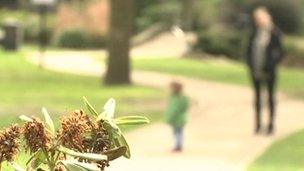Battle over who can and who cannot adopt in Northern Ireland
- Published

The adoption laws in Northern Ireland are different to the rest of the UK
Whether to adopt a child is one of the most serious and sensitive decisions anyone will ever take.
The adoption laws in Northern Ireland are different to the rest of the UK - in that the legislation says you can only adopt as a couple if you're married.
John O'Doherty is director of the Rainbow Project, which works on behalf of the gay community.
He wanted to adopt a child with his partner, but couldn't because of the legal situation.
"I wanted to form a family and a lifetime bond which would always be there," he says.
"Sadly, the Northern Ireland Assembly don't seem to think that's a right we should have."
If his relationship was not legally recognised, either he or his partner would have been eligible to apply to adopt as a single person.
But as people in a civil partnership are neither married nor single, they cannot adopt at all under the current legislation.
John O'Doherty and his partner are now considering an application to become foster parents.
But the 18 October judgement at the High Court may mean they may be able to adopt after all.
Vulnerable
The Northern Ireland Human Rights Commission challenged the law that bars gay couples from adopting, on the grounds that it breached the European Convention on Human Rights.
And Mr Justice Treacey has ruled in the Commission's favour - saying that he could find no basis for the argument that the current criteria for adoptive parents served the best interests of the child.
He said civil partners "suffer unjustifiable discriminatory treatment" compared to others who are not married but in a heterosexual relationship, who can apply to adopt an individual.
The Health Minister Edwin Poots, of the DUP, has said he plans to "urgently appeal" the ruling. He says he "not convinced that today's judgment is ultimately in the best interests of some of the most vulnerable children in Northern Ireland."

Adoption has become a legal and political issue
The TUV leader Jim Allister took a stronger line, saying: "Once more we see the human rights mantra being exploited to further divorce the law from the moral expectations and norms of the society it exists to serve."
When a Department of Health review team under the then Direct Rule Minister Paul Goggins proposed extending adoption to unmarried and same-sex couples in 2006, it was clear there would be strong opposition.
When the plans were put out to consultation, 95% of the responses opposed allowing same-sex and unmarried couples to adopt.
That may help to explain why there was no move to take that aspect of the proposed legislation forward when power returned to Stormont the following year.
In 2010 the Executive did agree a draft bill to update adoption law - but it did not include a provision to open up adoption to gay and unmarried couples.
The bill was dropped from the legislative programme in October of that year.
'Heavy heart'
Ulster Unionist MLA Tom Elliott has two adopted children.
He says the law needs to be reformed - but he says there are more pressing issues than the debate around allowing same-sex couples to adopt.
"The vast, vast majority of queries about adoption are not about whether same-sex couples are able to adopt, or indeed whether unmarried heterosexual couples can adopt," he says.
He adds that most concerns are about getting a child placed in a family as soon as possible, support for adoptive families, and giving a child the best start in life.
No matter what people think about whether a gay couple should be able to adopt, everyone seems to agree the 25-year-old legislation governing adoption in Northern Ireland must be brought up to date.
The Health Minister says he is committed to a new bill - but he claims the lawsuit brought by the Human Rights Commission has held this up.
He says he is appealing the High Court judgement "with a heavy heart" - because doing so could further delay a change in the law which he believes is already overdue.
Chris Page will be reporting on this issue on The View, on BBC1 at 2235 BST 18 October, and then on iPlayer.
- Published22 March 2012
- Published18 November 2011